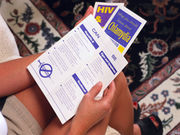More people agree to screening when told they’ll be checked unless they choose otherwise
THURSDAY, Jan. 21, 2016 (HealthDay News) — “Opt-out” testing could significantly increase the number of patients who agree to be tested for HIV, according to research published online Jan. 19 in The BMJ.
The study, which involved 4,800 patients seen in the emergency department, is the first randomized controlled trial to evaluate consent for HIV testing. None of the patients involved had ever tested positive for the virus. The researchers divided the patients into three groups based on different approaches to offering HIV testing. The first group received an “opt-in” approach, which let them know that testing was available but they had to specifically request the test. The second group received an “active choice” approach and were directly asked if they wanted to be tested for the virus. The third group received the “opt-out” approach. These individuals were tested for HIV unless they specifically asked not to be screened.
The researchers found 38.0 percent of the patients in the “opt-in” group agreed to be tested for HIV. Meanwhile, 51.3 percent of those in the “active choice” group and 65.9 percent in the “opt-out” group accepted the HIV test.
“Our study provides evidence that small changes in wording can significantly affect patients’ behavior and thus our understanding of their preferences and is crucial to providing patient centered care,” study leader Juan Carlos Montoy, M.D., from the University of California, San Francisco, and colleagues write.
Copyright © 2016 HealthDay. All rights reserved.








